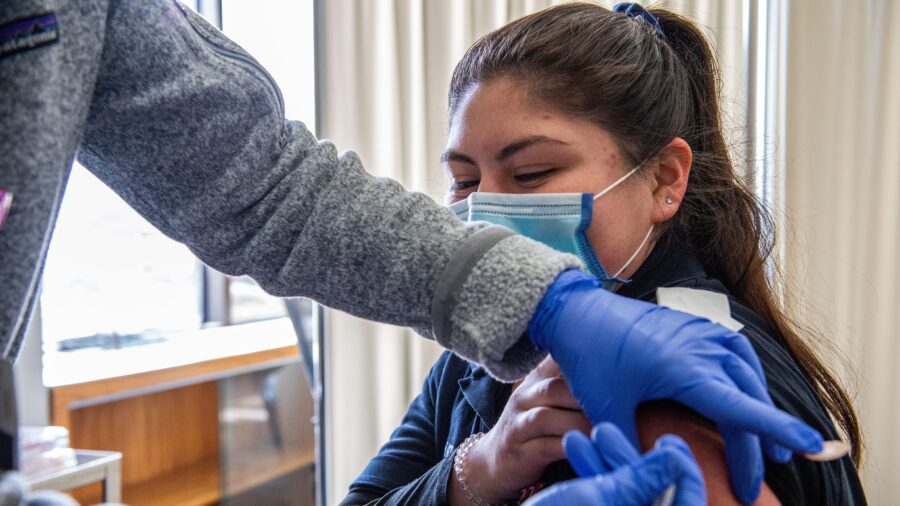The World Health Organization removed its advice against administering the Moderna vaccine for the CCP virus on pregnant women, after earlier saying it did not recommend the shot.
Earlier, on Tuesday, the WHO said on its website, “While pregnancy puts women at a higher risk of severe COVID-19, the use of this vaccine in pregnant women is currently not recommended, unless they are at risk of high exposure (e.g. health workers).”
WHO director of immunization Kate O’Brien told Reuters at the time that more data is required. “There is no reason to think there could be a problem in pregnancy, we are just acknowledging the data is not there at the moment,” she said.
But in the updated guidance as of late Friday, while still acknowledging that “very little data” is available, the WHO has removed its advice against taking the Moderna vaccine for pregnant women.
“While pregnancy puts women at higher risk of severe COVID-19, very little data are available to assess vaccine safety in pregnancy. Nevertheless, based on what we know about this kind of vaccine, we don’t have any specific reason to believe there will be specific risks that would outweigh the benefits of vaccination for pregnant women,” the WHO now says on its website.
“For this reason, those pregnant women at high risk of exposure to SARS-CoV-2 (e.g. health workers) or who have comorbidities which add to their risk of severe disease, may be vaccinated in consultation with their health care provider.”
The WHO did not immediately respond to a request for comment from The Epoch Times on what prompted the change in its Moderna vaccine advisory.

While the advisory for pregnant women has changed, the WHO is still not recommending the Moderna vaccine for people who have a history of any severe allergic reaction to any component of the vaccine.
“While vaccination is recommended for older persons due to the high risk of severe COVID-19 and death, very frail older persons with an anticipated life expectancy of less than 3 months should be individually assessed,” the WHO also noted in its advisory, adding, “The vaccine should not be administered to persons younger than 18 years of age pending the results of further studies.”
The WHO’s updated guidance is similar to the Centers for Disease Control and Prevention’s (CDC) guidance, which acknowledges that there are limited data about the safety of COVID-19 vaccines, including mRNA vaccines, for pregnant women, but adds that “people who are pregnant and part of a group recommended to receive the COVID-19 vaccine may choose to be vaccinated.”
It said that studies are being planned for vaccines for pregnant women, but in the meantime, vaccine manufacturers Moderna and Pfizer-BioNTech are monitoring people in their clinical trials who became pregnant.
Earlier in January, officials in California advised vaccine providers not to administer any doses of a batch of more than 330,000 doses that were produced by Moderna, due to a “higher-than-usual number of possible allergic reactions.”

The CDC on its website noted that there were “no safety concerns” demonstrated in rats that received the Moderna vaccine before or during pregnancy, and that studies for the Pfizer-BioNTech vaccine on pregnant women are ongoing.
The CDC said of mRNA vaccines in general, “mRNA vaccines do not contain the live virus that causes COVID-19 and, therefore, cannot give someone COVID-19. Additionally, mRNA vaccines do not interact with a person’s DNA because the mRNA does not enter the nucleus of the cell. Cells break down the mRNA quickly.
“Based on how mRNA vaccines work, experts believe they are unlikely to pose a specific risk for people who are pregnant. However, the actual risks of mRNA vaccines to the pregnant person and her fetus are unknown because these vaccines have not been studied in pregnant women.”
The CDC in November 2020 found that pregnant women who contract the CCP (Chinese Communist Party) virus are more at risk for severe illness and death than non-pregnant women who contract the disease.
More recently, a new study funded by the National Institutes of Health released on Jan. 28 found that pregnant women who become severely or critically ill due to CCP virus “are at greater risk of dying and experiencing serious pregnancy complications,” which include “postpartum hemorrhage, hypertensive disorders of pregnancy and preterm birth,” than pregnant women who have the CCP virus but were asymptomatic or without symptoms.
Moderna recently announced it had developed a new vaccine booster for a new South African variant of the CCP (Chinese Communist Party) virus, the B.1.351 variant, and will advance it into a phase one study.
From The Epoch Times

